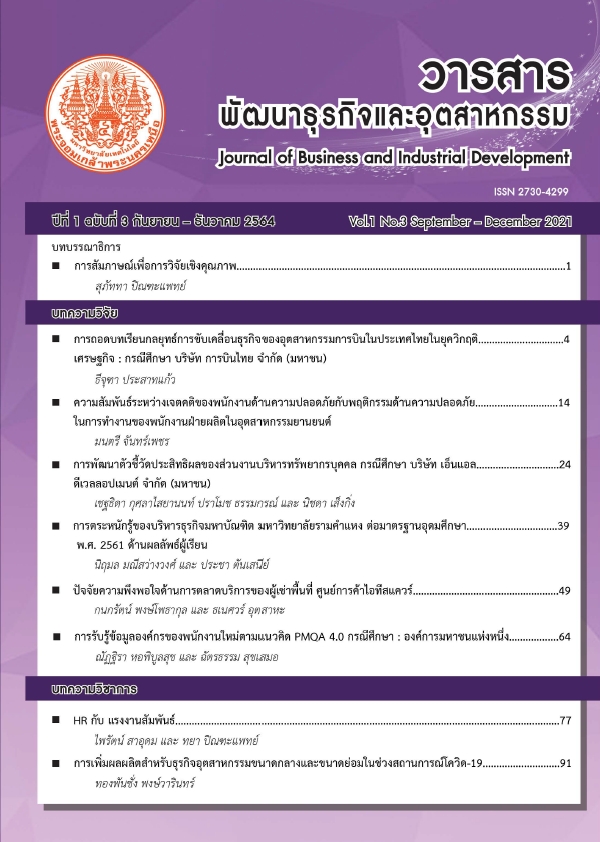Development of Human Resource Key Performance Indicators: A Case Study of NL Development Public Company Limited
Keywords:
Development, Effectiveness Indicators, Balanced Scorecard TheoryAbstract
The purposes of this qualitative research were 1) to investigate organizational characteristics, efficiency indicators, SWOT analysis and HR Scorecards for the HR department of the year 2019; and 2) to develop efficiency indicators for human resource key performance indicators for the HR department. The participants were 7 purposive employees working in the HR Department. The qualitative data were obtained by using structured interviews. As results, the 4 HR Key Performance Indicators (HR KPIs) constituted 27 indicators according to Balanced Scored Theory: 1) Financial perspective with 3 indicators: 1.1) HR budgeting strategy to ensure effective HR management; 1.2) Budget control for greater efficiency in HR Operations; and 1.3) Reducing recruitment costs. 2) Customer perspective with 3 indicators: 2.1) Satisfaction among welfare recipients; 2.2) Satisfaction among training participants; and 2.3) Satisfaction assessment of labor delivery. 3) Internal process perspective with18 indicators, the 3 essential keys were 3.1) Job recruitment operations according to budget plan and manpower planning; 3.2) Candidate's education verification from the beginning; and 3.3) Completeness and accuracy of any information involving policy on employees’ compensation and benefits. 4) Learning and Development Perspective with 3 key performance indicators: 4.1) Implementation of quality management system based on the ISO 9001: 2015 standards; 4.2) Encouraging personnel to understand and recognize the organization's core values; and 4.3) Digital media adoption and engagement for employee empowerment in the Industry 4.0 Era.
References
Meesuttha, A. (2011). Performance Appraisal (Revised Version), (18th ed.). Bangkok: Technology Promotion Association (Thailand-Japan).
Kaplan, R.S. and Norton, D. P. (1996). The Balanced Scorecard: Translating Strategy into Action. Boston: Havard Business School.
Kittiwimonchai, P. (2013). Performance Indicator Development of Supporting Organization Under the Office of the President, Khon Kaen University. Received Funding for an Institute Research Project Khon Kaen University.
วิโรจน์ ลักขณาอดิศร. (2009). หลุดจากกับดัก : Balanced Scorecard, กรุงเทพมหานคร : บมจ. ซีเอ็ดยูเคชั่น.
Kittiwimonchai, P. et al. (2012). Education to Define Outcome Indicators (KPI) Based on Educational Standards for Excellence and Discipline in Bringing an Actionable Education Guide to Practice. Received Funding for an Institute Research Project Khon Kaen University.
Sacchanand, C., & Prommapun, B. (2011). Development of Standards and Indicators of Living Library Operations Model of Learning Park. MANUTSAT PARITAT: Journal of Humanities, 33(2), 1-18.
Prasoetthap, V. (2019). Development of Audit Quality Indicators to Enhance Audit Quality of Thai Audit Firm to Universal Standard. Romphruek Journal, 37(1), 55-65.
Hinkaew, W. (2010). The Key Performance Indicators for Building Inspectors. [Unpublished master’s thesis]. Silpakorn University.
Paepong, A. (2014). A Study on Influence of Personal Factors, Balanced Scorecard, and Teamwork on Work Effectiveness of Operational Staff in Silom Business District. [Unpublished master’s thesis]. Bangkok University.
Jujia, S., & Mungsing, S. (2017). The Development of Quality Indicator of Learning Object. KKU Research Journal of Humanities and Social Sciences (Graduate Study), 5(3), 57-68.
Downloads
Published
How to Cite
Issue
Section
License

This work is licensed under a Creative Commons Attribution-NonCommercial-NoDerivatives 4.0 International License.





